In the heart of every home lies a kitchen, a space where culinary creativity takes flight and cherished memories are made. The allure of a small farmhouse kitchen embodies a unique charm that transcends mere aesthetics; it invites us into a world steeped in warmth, simplicity, and authenticity. With its rustic wood beams, vintage accents, and the comforting scent of home-cooked meals, this intimate setting transcends function, becoming a canvas for connection and comfort. In an age dominated by sleek modernity, the small farmhouse kitchen stands as a testament to enduring tradition—a sanctuary where ingredients tell stories, and where every gathering revolves around the shared experience of nourishment. Join us on a journey as we explore how embracing the essence of a small farmhouse kitchen can bring heart and soul back into our homes, reminding us of the beauty found in simplicity and the joy of living in harmony with our surroundings.
Creating Timeless Style in Your Farmhouse Kitchen
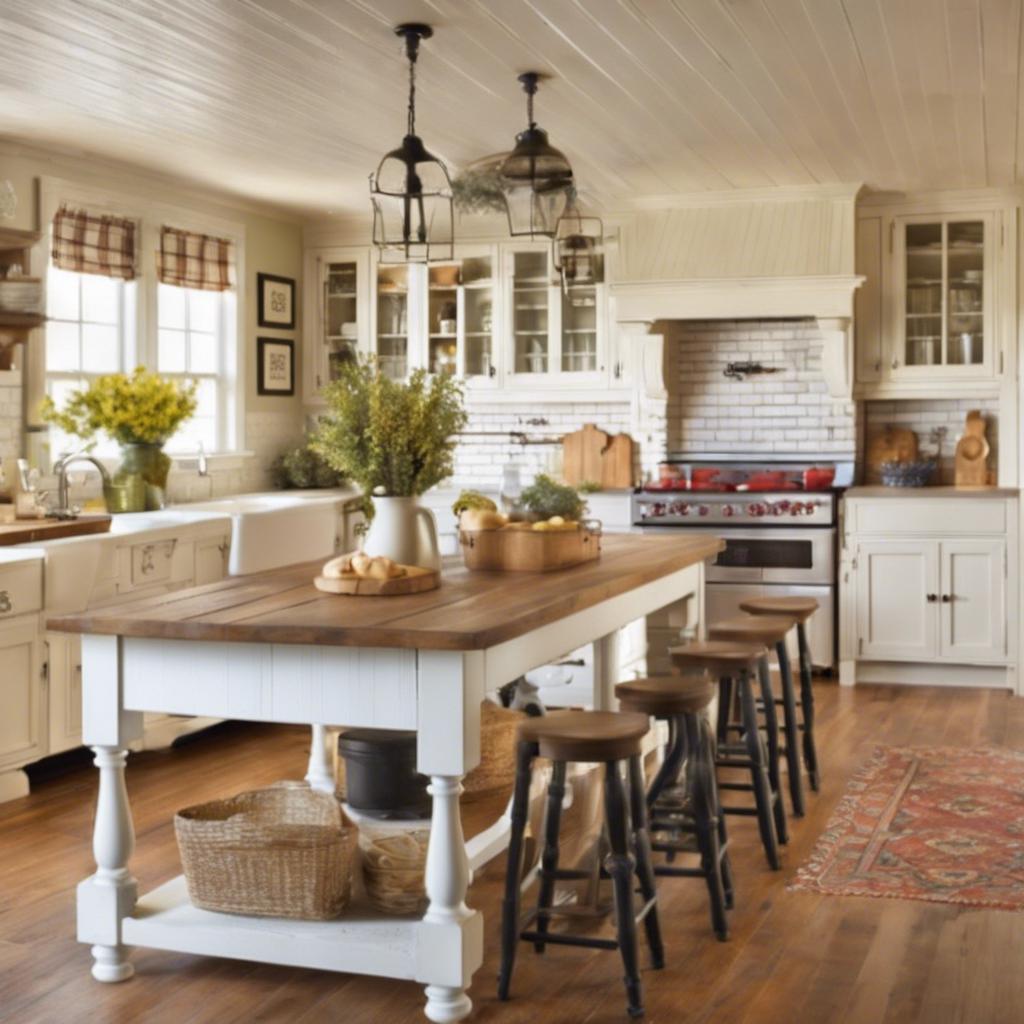
Crafting a kitchen that resonates with timeless style requires a careful balance of aesthetics and functionality. Natural materials play a vital role in achieving this charm; consider opting for reclaimed wood countertops and open shelving. These elements not only tell a story of their own but also blend seamlessly with the rustic undertones of a farmhouse. Adding vintage accents like wrought iron hardware, antique light fixtures, and ceramic dishware can infuse warmth and character, creating a welcoming atmosphere that invites family and friends to gather. Layering these textures helps create visual interest, ensuring that the space feels both lived-in and elegant.
In addition to materials and accents, a sophisticated color palette can dramatically influence the ambiance of your kitchen. Soft whites, muted grays, and earthy tones provide a calming backdrop, allowing decorative items to take center stage. Consider incorporating a mix of patterns in textiles, such as checked curtains, farmhouse-style aprons, or even a classic patchwork tablecloth, to enhance the coziness without overwhelming the senses. Here’s a quick overview of elements that contribute to an enduring style:
| Element | Description |
|---|---|
| Reclaimed Wood | Brings an organic touch and rustic appeal. |
| Vintage Hardware | Adds character and a sense of history. |
| Timeless Colors | Soft whites and earthy tones create serenity. |
| Patterned Textiles | Enhances warmth and hominess. |
The Importance of Natural Light in a Farmhouse Kitchen
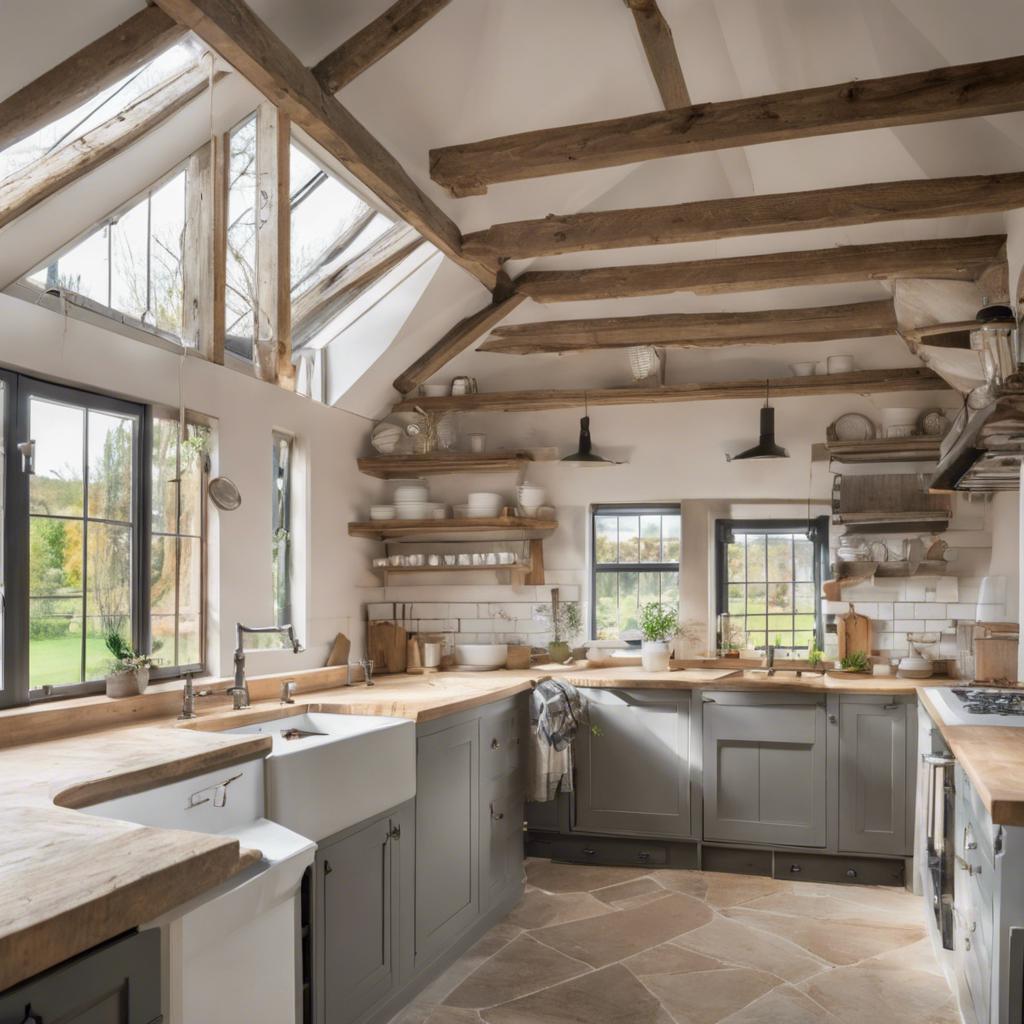
Natural light is more than just an aesthetic choice in a farmhouse kitchen; it serves to enhance the overall functionality and atmosphere of the space. Large windows and skylights flood the kitchen with sunlight, creating a warm, inviting environment perfect for cooking and gathering. This illumination not only aids in food preparation by allowing cooks to see the true colors and textures of their ingredients but also helps to create a lively ambiance for family and friends to enjoy. Here are some benefits of incorporating natural light:
- Boosts Mood: Sunlight can elevate spirits and encourage productivity.
- Energy Efficiency: Utilizing daylight reduces the need for artificial lighting, thus saving energy.
- Enhanced Aesthetics: Natural light highlights the unique features and charm of farmhouse design elements.
Moreover, the quality of light during different times of the day can transform the kitchen experience. Morning light can create a refreshing start to the day, filtering through the windows and inviting the morning energy into the heart of the home. Afternoon rays can create a cozy, golden glow that softens the hard edges of countertops and enhances the textures of handmade tiles. With strategic placements of windows or light wells, the kitchen can serve as a mesmerizing canvas painted with the ever-changing hues of nature. Consider these aspects:
| Time of Day | Effect on Kitchen |
|---|---|
| Morning | Bright and energizing, promotes a vibrant start |
| Afternoon | Soft, warm glow enhances comfort and intimacy |
| Evening | Creates a cozy and inviting atmosphere for gatherings |
Choosing the Right Color Palette for a Farmhouse Kitchen
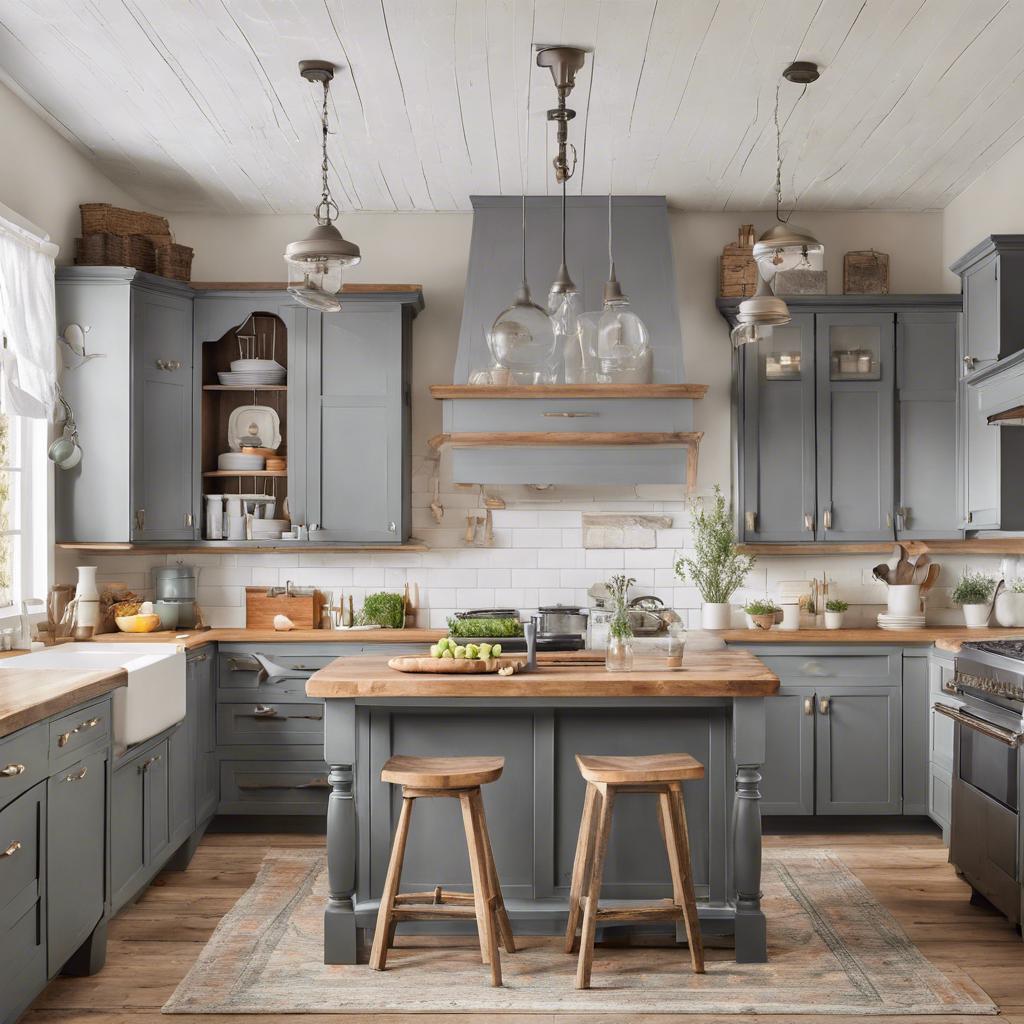
When it comes to designing a cozy farmhouse kitchen, the color palette plays a vital role in evoking warmth and charm. Soft, muted tones often work best in these spaces, creating an inviting atmosphere that resonates with the essence of a rural retreat. Some popular choices include:
- Warm Whites: They provide a clean backdrop that enhances natural light.
- Pale Blues and Greens: These hues suggest tranquility, reminiscent of open skies and rolling hills.
- Earthy Neutrals: Shades like taupe or beige ground the space, bringing in the organic warmth of natural materials.
- Rustic Reds or Deep Grays: These colors add a quaint pop, highlighting the vintage character of farmhouse decor.
A great way to unify your chosen colors is through thoughtful accents and decor. A well-placed table can showcase a harmonious palette while serving practical purposes. Consider incorporating:
| Color | Accent Idea |
|---|---|
| Soft White | Whitewashed wood shelves for rustic charm |
| Dusty Blue | Ceramic dishes or tiled backsplash |
| Warm Gray | Metal farm-style light fixtures |
| Muted Sage | Greenery accents like herbs for a fresh touch |
Essential Elements of Farmhouse Kitchen Decor
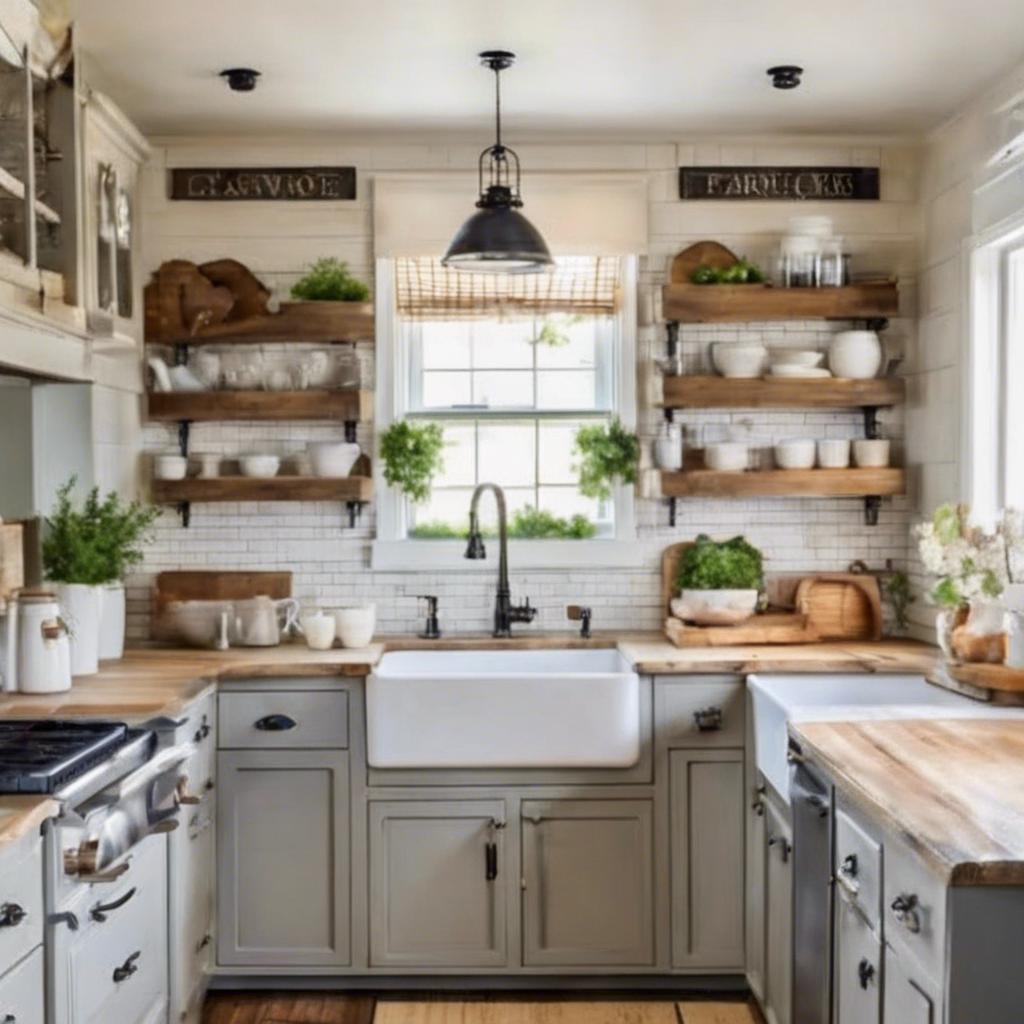
To evoke the warmth and nostalgia of a farmhouse kitchen, incorporating natural materials is vital. Wooden elements play a prominent role, from rustic dining tables to open shelves adorned with handcrafted dishes. Consider using reclaimed wood for cabinets or accent pieces, which not only adds character but also tells a story of its own. Furthermore, stone countertops bring a touch of earthy elegance and durability, while woven baskets can serve both functional and decorative purposes, offering storage for produce or kitchen linens.
Color palettes in farmhouse kitchens typically lean towards soft, muted tones that create an inviting atmosphere. Shades of cream, pale green, and powder blue harmonize beautifully with the rich textures of wood and metal. To accentuate these colors, introduce vintage accents, such as antique kitchen scales or mason jars filled with fresh herbs. don’t overlook the importance of lighting; pendant lights with a farmhouse flair above the kitchen island or rustic chandeliers can draw focus while enhancing the cozy vibe of this cherished space.
Open Shelving Ideas for a Farmhouse Kitchen
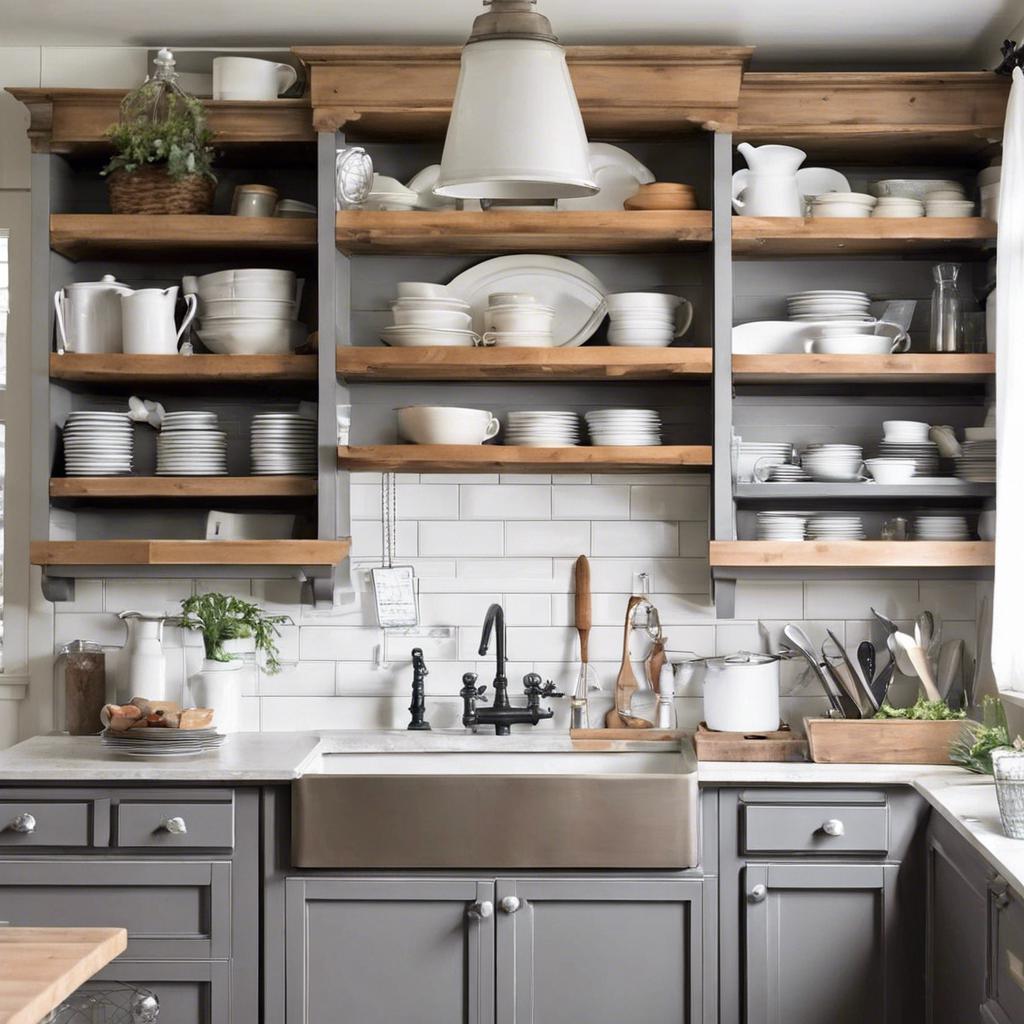
In a small farmhouse kitchen, open shelving brings a rustic yet modern charm that transforms the space into a warm gathering place. Natural wood shelves, stained in rich hues, can be positioned above your countertop for both functionality and aesthetics. Adorn them with a mix of practical items and decorative touches to create a balanced look. Consider displaying:
- Vintage dishware in soft pastels
- Mason jars filled with spices or dried herbs
- Handcrafted mugs that add a personal touch
- Potted herbs to bring freshness and a burst of green
To create visual interest, think about varying the height and depth of your shelving. Floating shelves paired with reclaimed barn boards establish a unique contrast while offering ample space for displaying treasured collections. Incorporating a small ladder can also enhance accessibility while adding an extra layer of farmhouse charm. Here’s how you might choose to mix practical and decorative elements on your shelves:
| Practical Items | Decorative Touches |
|---|---|
| Mixing Bowls | Framed family recipes |
| Cookbooks | Candles in unique holders |
| Cutting Boards | Seasonal decorations |
Incorporating Vintage Finds in Your Farmhouse Kitchen
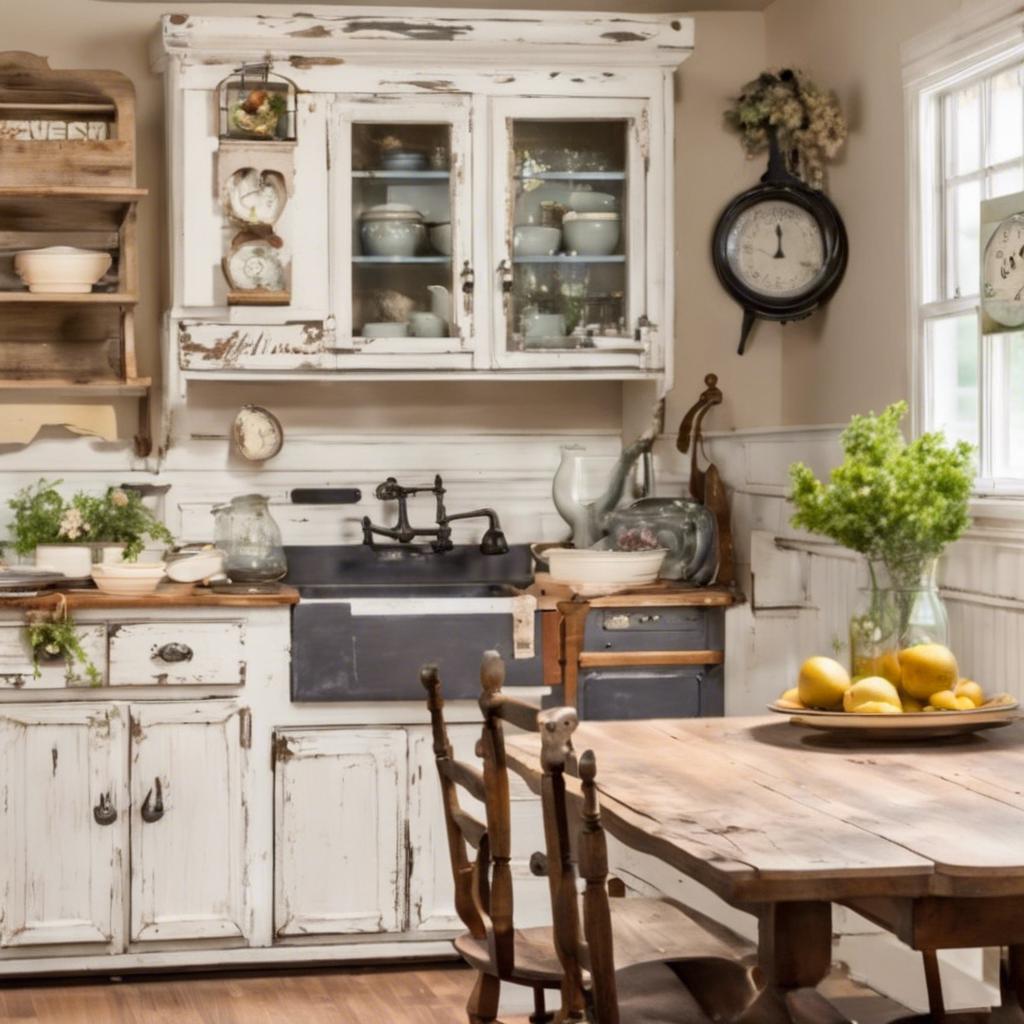
In a farmhouse kitchen, vintage finds can be the secret ingredient that transforms the space into a cozy and inviting culinary haven. Incorporating antique pieces not only infuses character but also tells a story. Consider adding items such as:
- Weathered Cabinets: Old cupboards with chippy paint can serve as both storage and a stunning focal point.
- Farmhouse Table: A rustic wooden table adds warmth and a communal feeling, perfect for family gatherings.
- Vintage Tableware: Mismatched plates and hand-thrown pottery bring charm to any meal.
When it comes to accessorizing, think about layering textures and colors. For instance, mix sleek modern appliances with well-loved kitchenware. A collection of vintage spice jars displayed on open shelving not only looks beautiful but also serves a practical purpose. You might also consider creating a small coffee station with a combination of:
| Item | Purpose |
|---|---|
| Ceramic Canisters | Store coffee, tea, or sugar with style |
| Old Books | Use them as coasters or decor |
| Mason Jars | Hold utensils or herbs |
Maximizing Space in a Cozy Farmhouse Kitchen
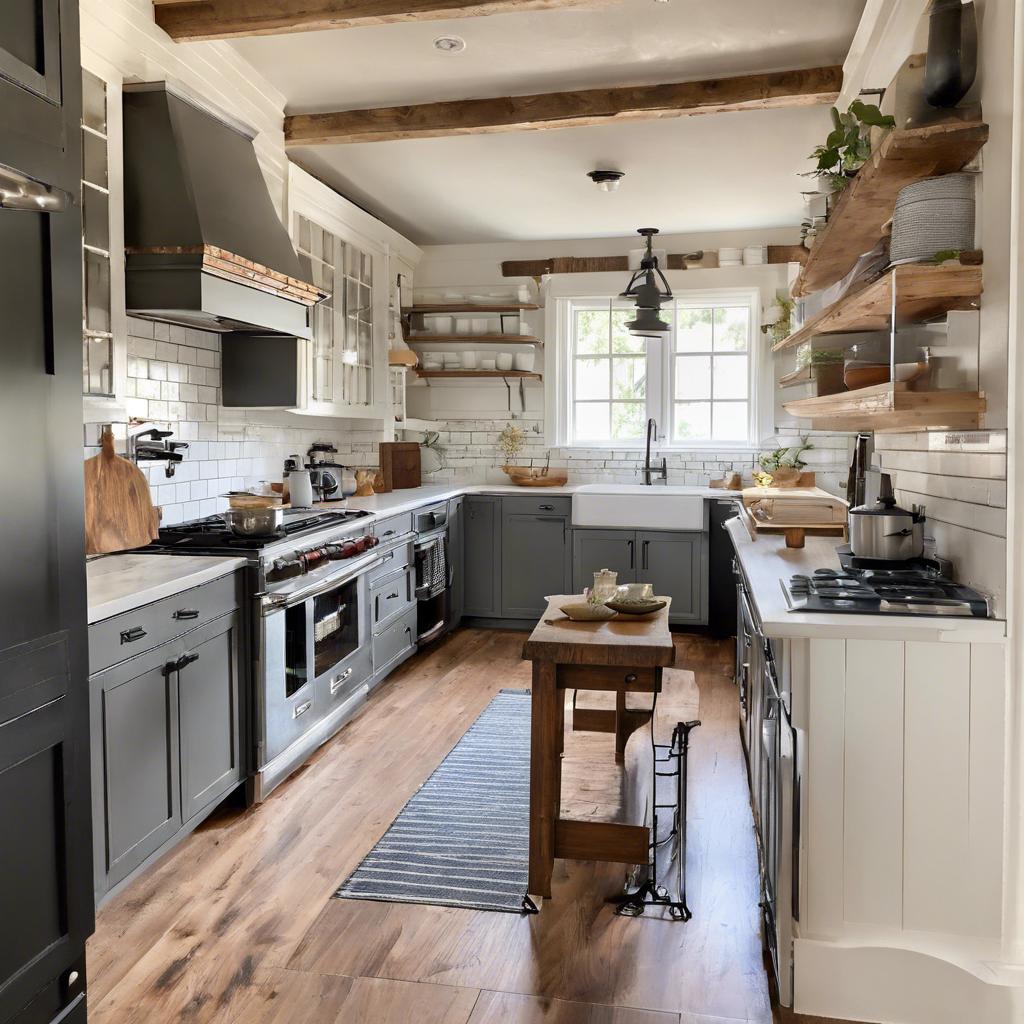
- Utilize Under-Sink Storage: Use stackable bins or rolling carts to keep cleaning supplies organized.
- Incorporate a Kitchen Island: Opt for a movable island that can double as a prep surface and dining area.
- Cabinet Door Organizers: Install racks or hooks on the inside of cabinet doors for lids and spices.
Thinking vertically can also transform your cozy kitchen. Utilize wall space by installing shelves that reach up to the ceiling, perfect for storing items you don’t need daily. Consider furniture pieces with built-in storage, such as benches with hidden compartments or dining tables with drawers. Displaying plants or herbs in hanging pots can bring life to the room while keeping your countertops clutter-free. Here’s a quick overview of some practical storage concepts:
| Storage Idea | Description |
|---|---|
| Floating Shelves | Utilize the vertical space for decorative or functional items. |
| Rolling Carts | Portable storage solution that can be moved as needed. |
| Drawer Dividers | Keeps utensils sorted and easy to access. |
| Over-the-Door Racks | Maximize door space for easy access to spices or cleaning supplies. |
The Heartwarming Appeal of a Farmhouse Kitchen Island
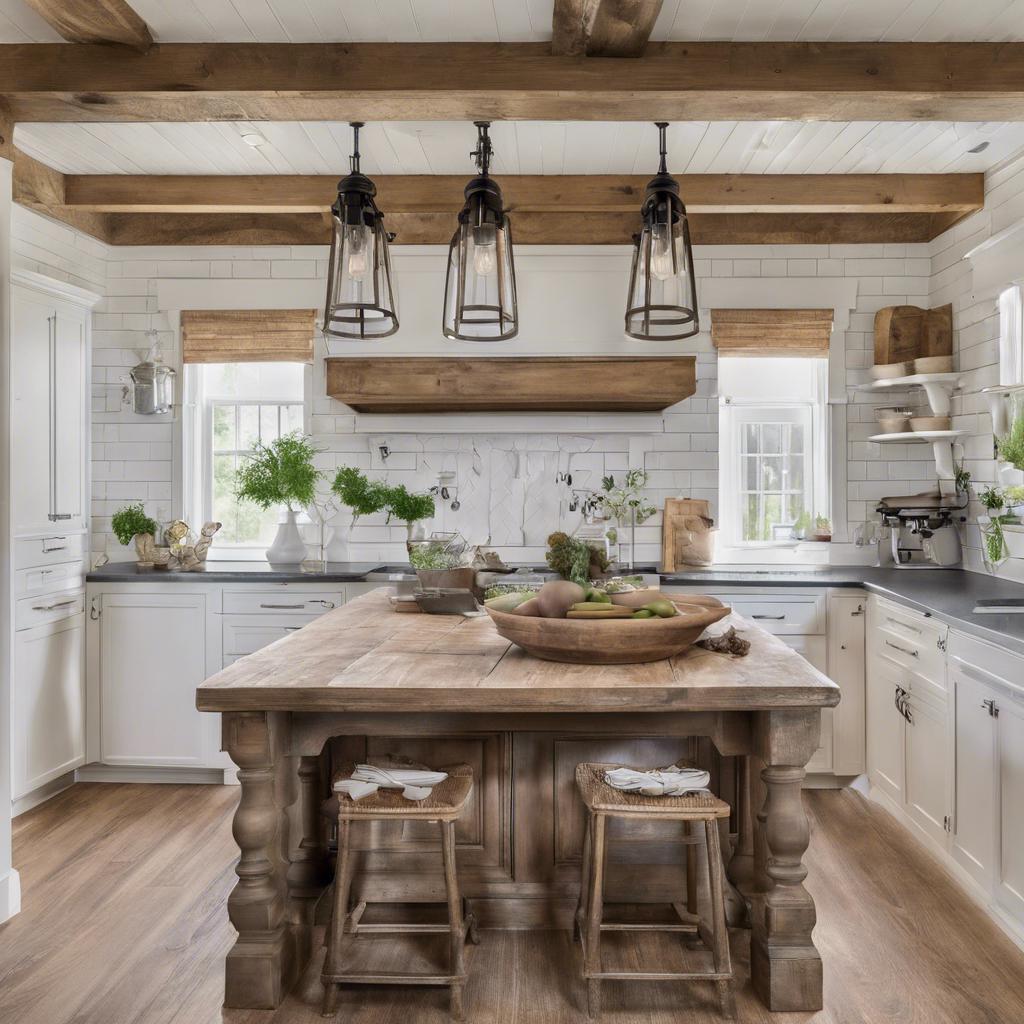
A farmhouse kitchen island serves as a beautiful centerpiece, seamlessly blending functionality and warmth. Often crafted from reclaimed wood or a rustic finish, these islands evoke a sense of nostalgia, inviting family and friends to gather around for shared meals and laughter. Whether it’s breakfast on a sunny morning or family game night, the island becomes an essential space where memories are made. Its generous surface area not only provides ample room for food preparation but also encourages creativity in the kitchen, allowing home cooks to spread out their ingredients and try new recipes.
Additionally, the versatility of a farmhouse kitchen island enhances both style and practical use. It can serve multiple purposes, such as:
- Dining Area: A cozy spot for quick meals or casual gatherings.
- Workspace: Perfect for baking, crafting, or showcasing seasonal décor.
- Storage Solution: A hidden space for pots, pans, and utensils that keeps the kitchen organized.
Incorporating a few decorative elements further elevates the island’s charm. Consider adding a collection of vibrant fruits in a bowl, rustic cutting boards, or a vase filled with fresh herbs to create a lively and inviting atmosphere. When styled thoughtfully, the island becomes not just a place for culinary endeavors, but also a heartwarming reflection of farmhouse life—where every corner whispers stories of hospitality and comfort.
Functional Layouts for an Efficient Farmhouse Kitchen
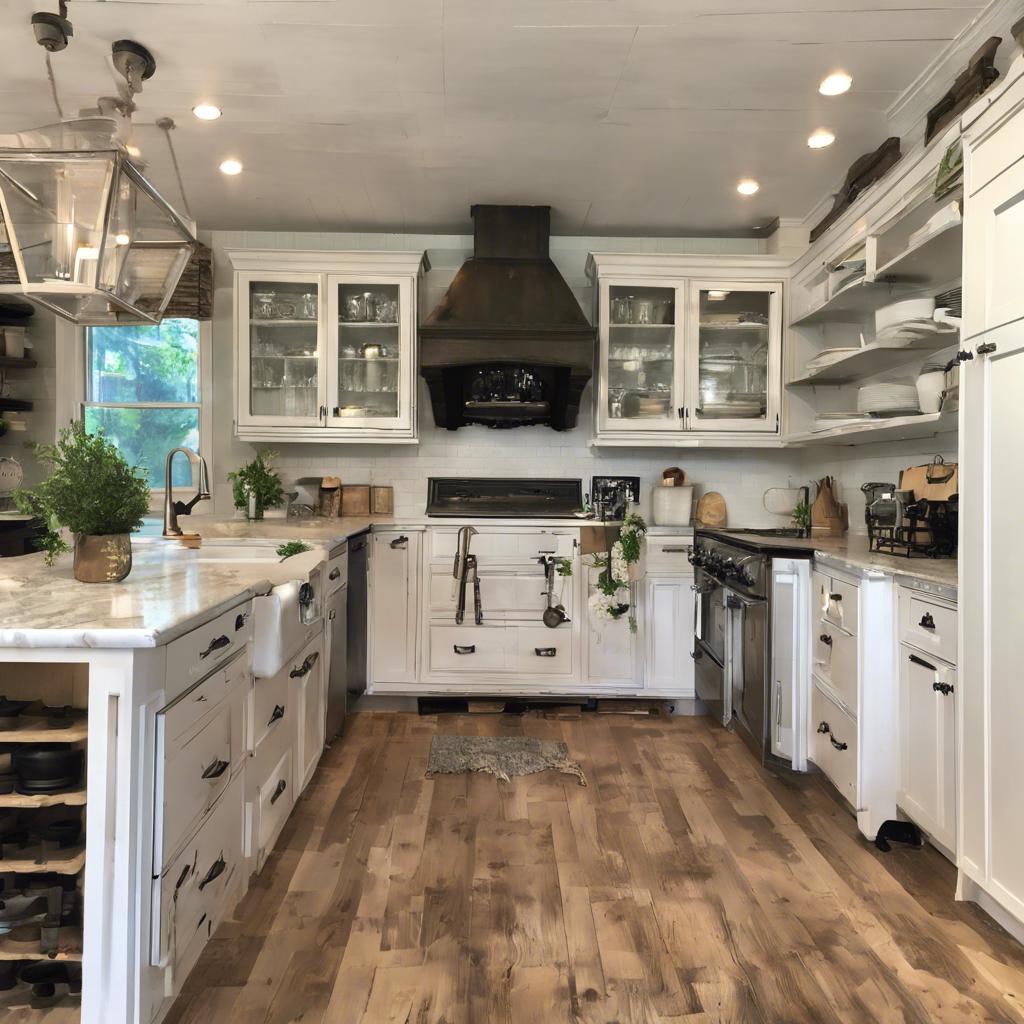
A well-planned kitchen layout can transform an ordinary space into a vibrant gathering hub that embodies both functionality and charm. The key to achieving this lies in adopting designs that maximize efficiency while maintaining a cozy atmosphere. Consider integrating a working island at the center of your kitchen; it provides extra prep space and doubles as a casual dining area. Open shelving can showcase rustic dishware, creating a visually appealing display while keeping essentials within easy reach. Structural choices like butcher block counters paired with vintage farm sinks not only enhance functionality but also add character to the overall design.
When designing the perfect farmhouse kitchen, incorporating elements that promote organization is crucial. Utilize cabinets that extend to the ceiling to take advantage of vertical space, all while keeping countertops uncluttered. Invest in pull-out shelves, deep drawers, and designated areas for frequently used items to streamline cooking tasks. A well-organized pantry can also be beneficial, blending seamlessly with cabinetry to maintain a uniform look. Here’s a simple table that outlines essential elements to consider for a functional kitchen layout:
| Element | Description |
|---|---|
| Working Island | Multi-functional space for prep and dining. |
| Open Shelving | Showcases dishware and keeps essentials accessible. |
| Ceiling-height Cabinets | Maximizes storage and keeps clutter minimal. |
| Pull-out Shelves | Enhances accessibility and organization. |
Selecting the Perfect Flooring for Your Farmhouse Kitchen
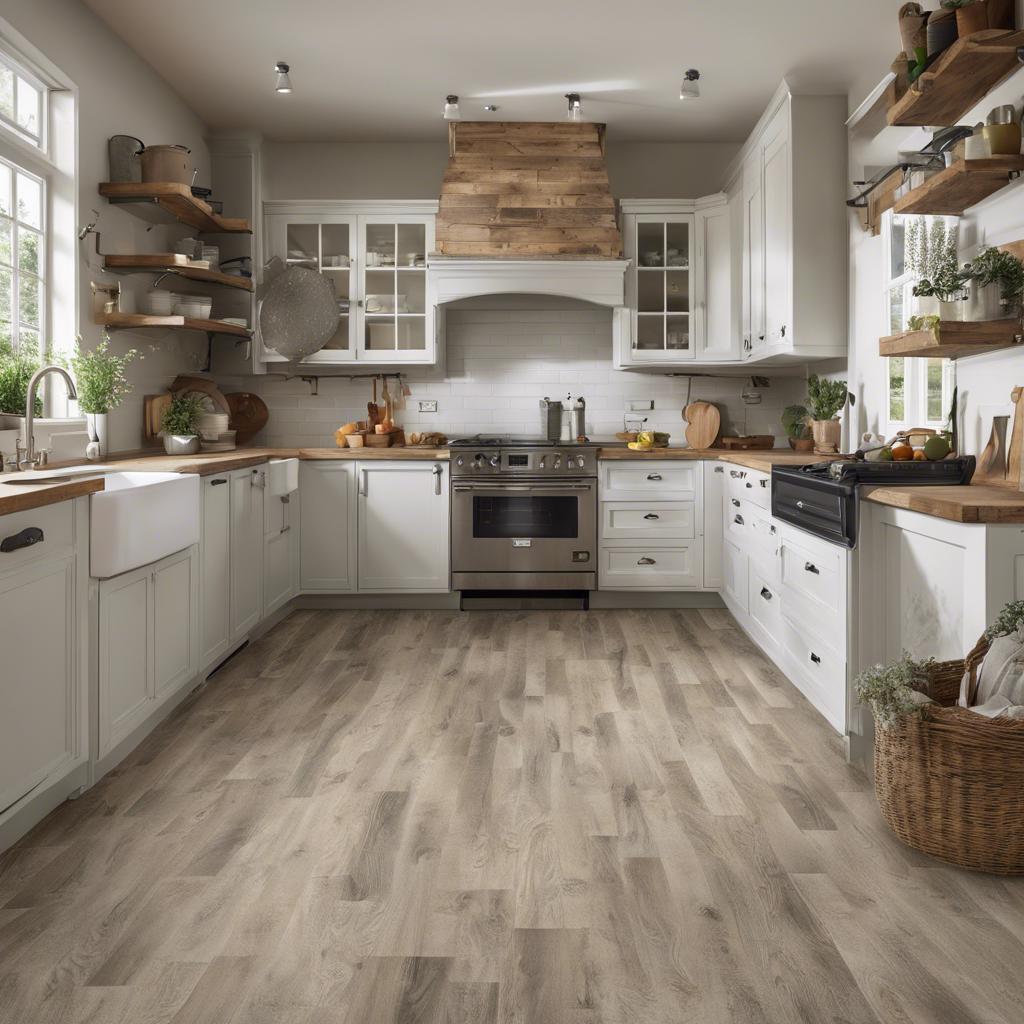
When it comes to choosing the right flooring for your farmhouse kitchen, it’s essential to consider both durability and aesthetic appeal. The farmhouse style embraces a rustic charm, so selecting materials that complement this design while standing up to the challenges of daily life is key. Here are a few flooring options that strike the perfect balance between practicality and farmhouse elegance:
- Hardwood: Timeless and warm, hardwood flooring adds character and can be refinished to refresh its beauty.
- Tile: Available in various colors and patterns, tiles are durable and easy to clean, making them ideal for busy kitchens.
- Laminates: Affordable and versatile, laminate floors come in designs that mimic natural wood or stone, providing style without breaking the bank.
- Concrete: An increasingly popular choice, polished concrete offers a modern rustic look and is exceptionally durable.
To help you make the best decision, consider the following factors:
| Material | Durability | Maintenance | Cost |
|---|---|---|---|
| Hardwood | Medium | Refinishing needed | $$$ |
| Tile | High | Easy to clean | $$$ |
| Laminates | Medium | Low maintenance | $$ |
| Concrete | Very High | Minimal | $$ |
By weighing these options against your lifestyle needs and the overall ambiance you wish to create, you will be well on your way to selecting flooring that perfectly complements the charm of your farmhouse kitchen.
The Role of Textiles in a Farmhouse Kitchen Design

Textiles play a pivotal role in establishing the cozy, inviting atmosphere that defines a farmhouse kitchen. They add layers of texture and warmth, making the space not only functional but also aesthetically pleasing. Consider incorporating natural fabrics like cotton and linen for tablecloths, curtains, and upholstered seating. These materials not only complement the rustic charm of a farmhouse but also provide an opportunity to showcase lovely patterns and colors, enhancing the overall character of the kitchen. The strategic use of textiles can tie together various design elements, creating a harmonious balance that feels effortless and lived-in.
To truly embody the essence of farmhouse aesthetics, pay attention to the small details. Dish towels, pot holders, and aprons can serve as practical tools while also acting as decorative pieces that add bursts of color and personality. Using handcrafted or locally sourced textiles can inject a unique story into your kitchen’s design, reflecting the heritage and craftsmanship that resonates with the farmhouse ethos. Additionally, layering textiles, such as using a textured rug beneath the dining table or draping a soft throw over a chair, can create inviting nooks that beckon family and friends to gather and share a meal.
Choosing Appliances that Blend with a Farmhouse Kitchen Aesthetic
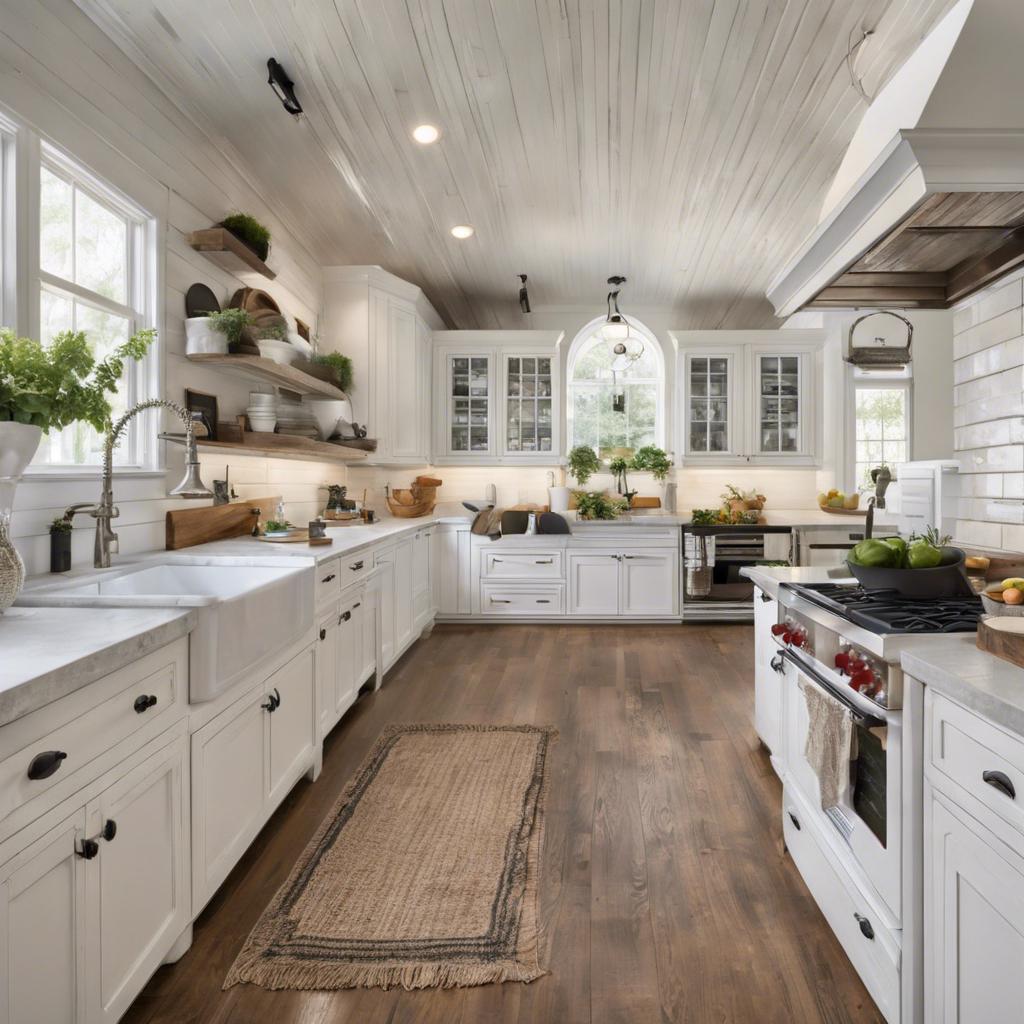
When curating appliances for a farmhouse kitchen, it’s essential to consider how each piece contributes to the overall aesthetic. Aim for timeless designs that evoke warmth and nostalgia, combining functionality with rustic charm. Look for vintage-inspired finishes, such as creamy whites, soft pastels, or classic matte black to create a cohesive look. Stainless steel can work too, especially when paired with wooden accents. Your choices should reflect the surrounding decor, whether it’s exposed beams, shiplap walls, or reclaimed wood. Selecting appliances with retro flair can serve as conversation starters and elevate the heart of your home.
Consider integrating heritage-style appliances that resonate with the farmhouse spirit. Here are some features to look for:
- Freestanding ranges: Opt for colors and details reminiscent of yesteryear.
- Farmhouse sinks: A deep, wide basin adds practical elegance.
- French door refrigerators: These blend sleek functionality with traditional aesthetics.
To assist in your selection process, refer to the table below for a quick comparison of popular styles:
| Appliance Type | Style | Finish Options |
|---|---|---|
| Refrigerator | French Door | Matte Black, Creamy White |
| Range | Freestanding | Pastel Colors, Classic Black |
| Dishwasher | Built-in | Stainless Steel, Textured Finishes |
Creating a Cozy Dining Nook in Your Farmhouse Kitchen
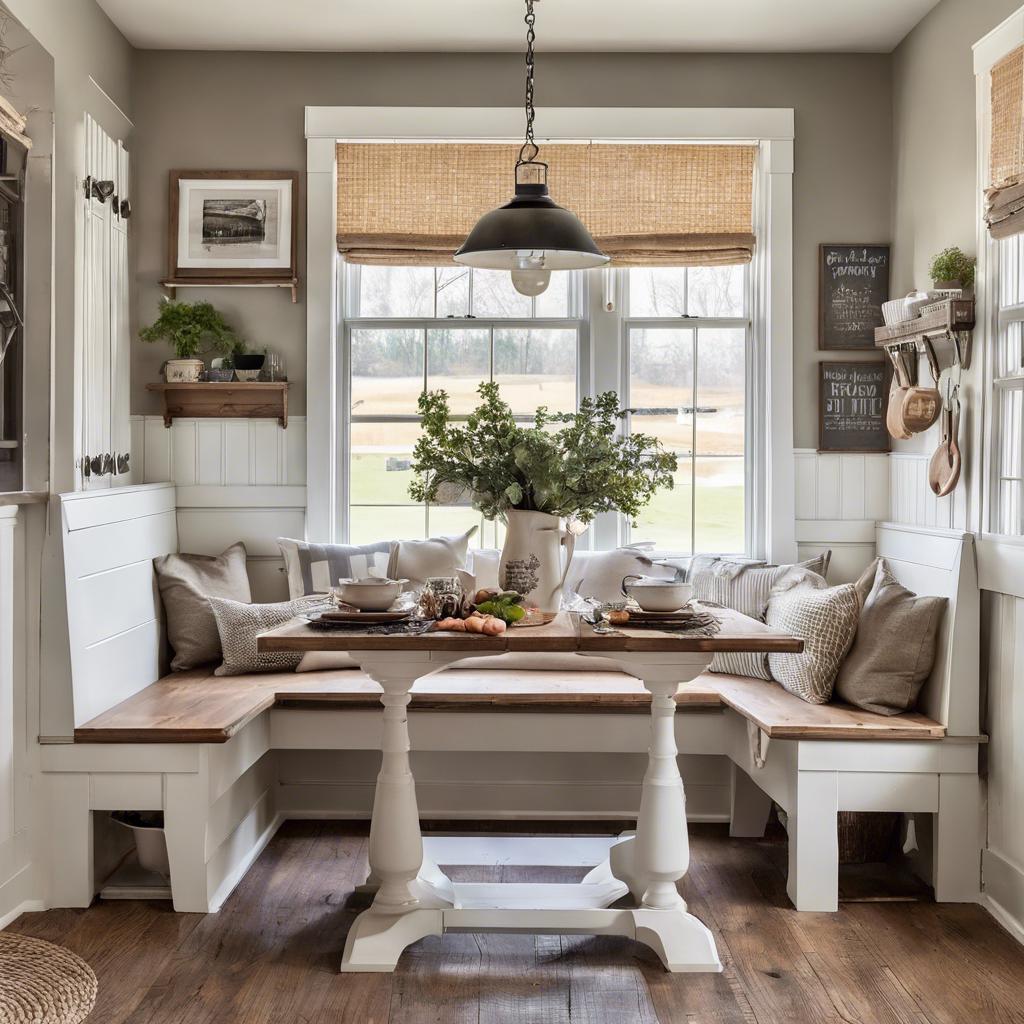
Lighting plays a crucial role in crafting a cozy nook. Opt for warm-toned pendant lights or a rustic chandelier that softly illuminates the space, setting the mood for leisurely meals or quiet breakfasts. Incorporating elements of nature, such as potted herbs or succulent plants, can further enhance the inviting feel while providing fresh ingredients at your fingertips. Additionally, hanging up a chalkboard or a simple string of photos can personalize the area, celebrating memories that resonate within your home. Below is a brief overview of decorative elements to consider for your cozy nook:
| Element | Description |
|---|---|
| Table | Round shape for intimacy, perhaps in reclaimed wood. |
| Seating | Cushioned benches or chairs for comfort and style. |
| Lighting | Warm pendant lights or rustic chandeliers for ambiance. |
| Decor | Lanterns, table runners, and personal touches like photos. |
| Plants | Potted herbs or succulents to add life and freshness. |
Integrating Nature and Greenery in Your Farmhouse Kitchen
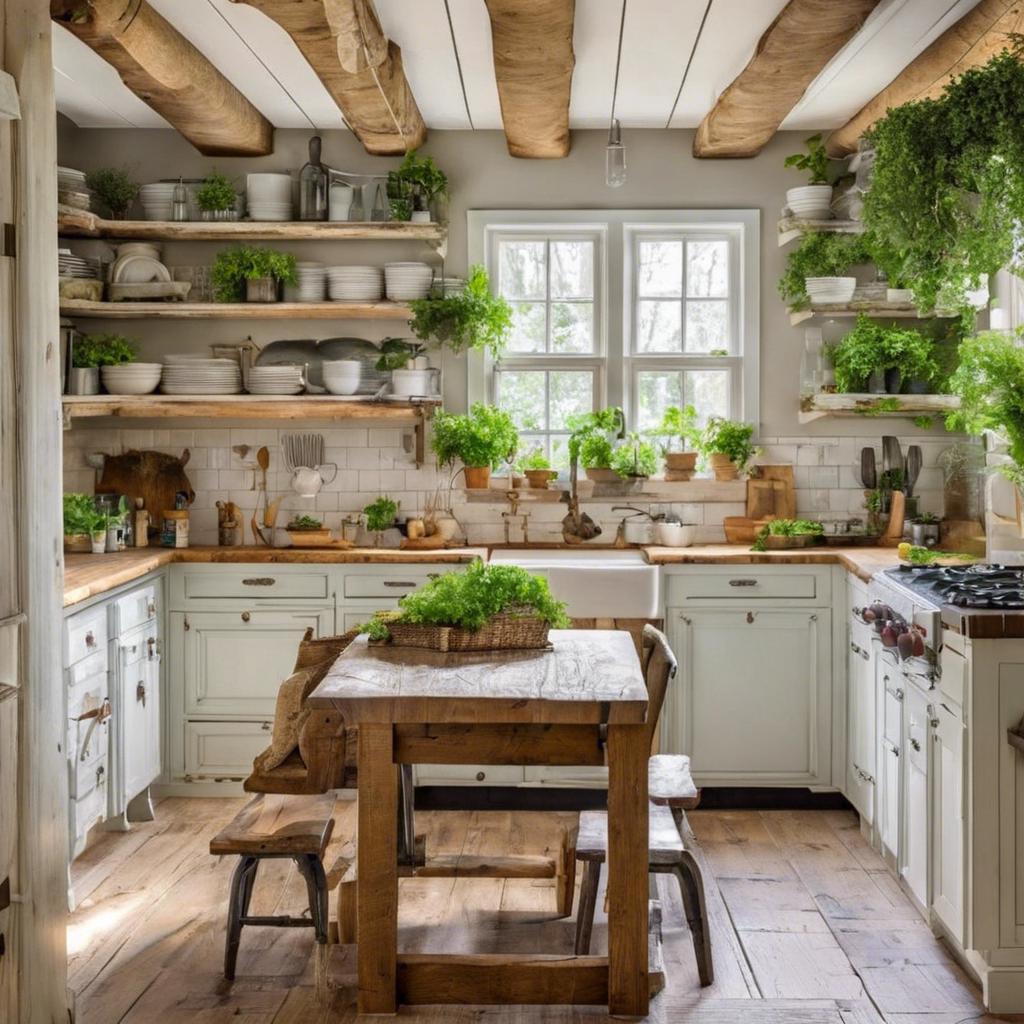
Transform your farmhouse kitchen into an inviting oasis by integrating nature and greenery throughout the space. This brings a refreshing ambiance that not only enhances the aesthetic appeal but also nurtures a sense of tranquility. Consider adorning your countertops and shelves with an array of herbs such as basil, rosemary, and mint. They not only add a burst of color but also provide fresh ingredients at your fingertips, perfect for that rustic farmhouse recipe. In addition to herbs, potted plants or hanging planters can be strategically placed near windows to maximize sunlight, allowing vibrant green foliage to thrive and breathe life into the kitchen environment.
Another thoughtful approach to harmonizing with nature is through the use of natural materials and earthy tones in your kitchen decor. Choose wooden accents for cabinets and shelves, or even reclaimed wood for countertops to add a rustic charm that complements the greenery. Incorporate simple elements like a wooden fruit bowl filled with seasonal produce to create a focal point that reflects the bounty of the farm. To further emphasize this connection, consider creating a small window herb garden where you can grow an assortment of herbs. This not only looks beautiful but also allows for easy access when cooking, seamlessly blending functionality with a touch of nature.
Personalizing Your Farmhouse Kitchen with Unique Accents
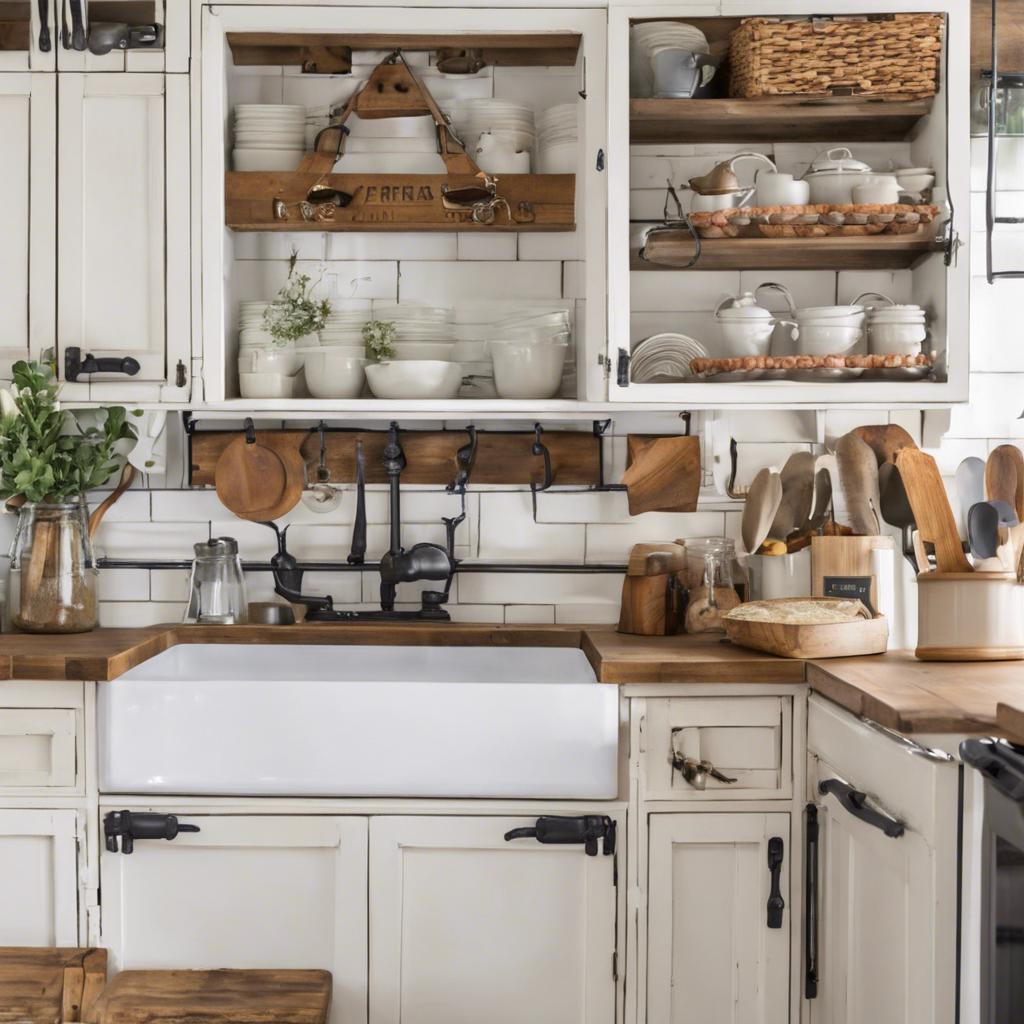
To truly embrace the charm of a farmhouse kitchen, it’s essential to incorporate unique accents that reflect your personality and style. Consider adding handcrafted pottery from local artisans or personalized cutting boards that tell your culinary story. Incorporate vintage finds, such as old mason jars or rustic wooden crates, which can serve both functional and decorative purposes. These elements not only enhance the aesthetic appeal but also create a warm, inviting atmosphere that encourages family gatherings and shared meals.
When selecting accent pieces, think about incorporating natural materials and textures that complement your existing décor. Items like woven baskets or metallic accents can serve as striking focal points. Adding greenery through potted herbs or hanging plants can breathe life into the space, making it feel both fresh and cozy. Here’s a quick overview of some delightful accent ideas:
| Accent Item | Description |
|---|---|
| Vintage Scale | A charming nod to the past, great for display or functionality. |
| Colorful Pottery | Adds a pop of color while being practical for serving and cooking. |
| Wrought Iron Decor | Excellent for adding a touch of rustic elegance. |
| Seasonal Wreaths | Bring in the changing seasons with a welcoming touch. |
Budget-Friendly Ways to Revamp Your Farmhouse Kitchen
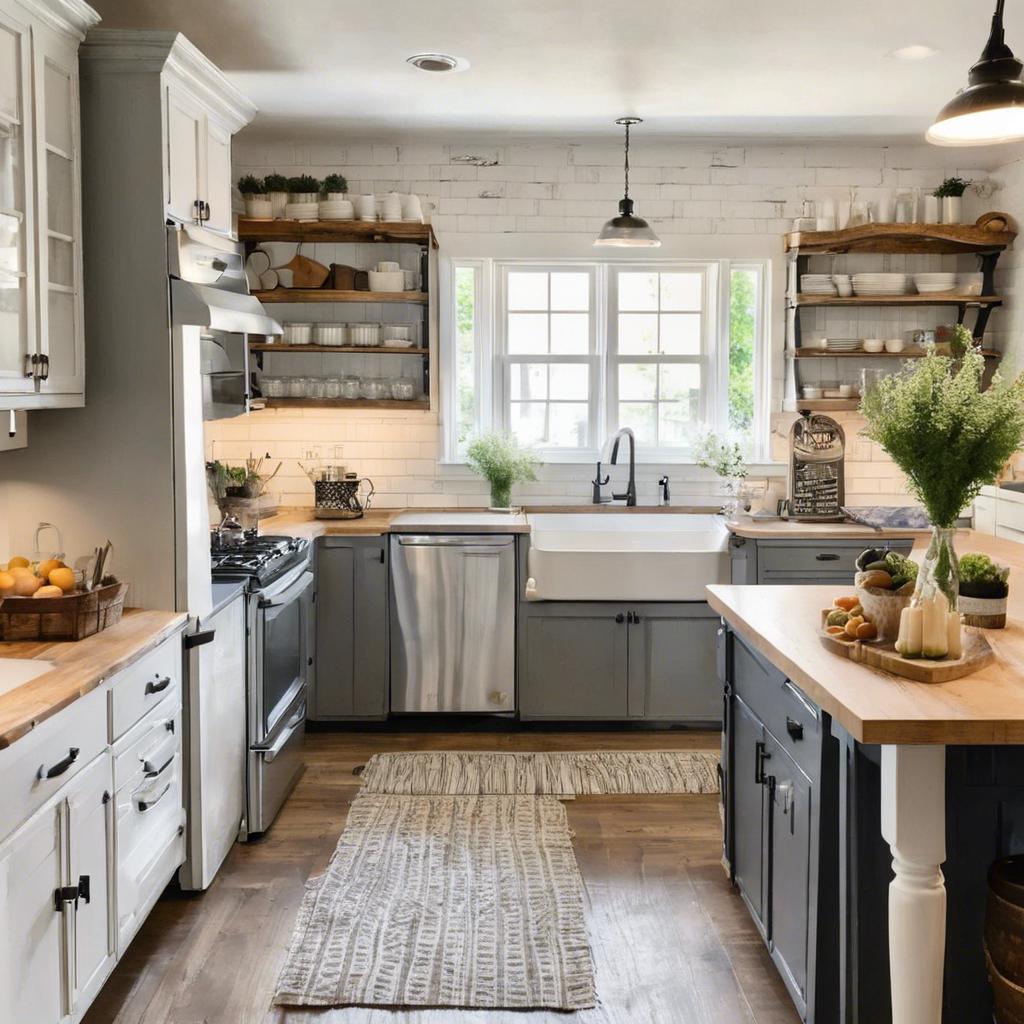
Transforming your farmhouse kitchen on a budget doesn’t have to break the bank. Start with simple DIY projects that can have a big impact. Paint your cabinetry for a fresh, vibrant look; a soft sage green or classic white can brighten the room and give it that farmhouse feel. Additionally, swap out hardware such as cabinet knobs and handles for more rustic options—brass or oil-rubbed bronze can add an elegant touch without significant expense. Other budget-friendly upgrades include installing open shelving to display charming dishware or vintage finds. This not only gives the space a cozy vibe but also maximizes storage and reduces clutter.
Incorporating natural elements can also enhance your kitchen’s charm. Consider adding live plants or herb gardens on windowsills for a splash of greenery that makes the space feel alive. Textiles are another cost-effective way to create warmth; opt for a beautiful, patterned tablecloth or rustic placemats to draw the eye. If you want to go a step further, you can refurbish your dining chairs by reupholstering them with farmhouse-patterned fabrics or even giving them a new coat of paint. With just a little creativity, you’ll turn a standard kitchen into a delightful gathering place that perfectly captures the charm of farmhouse living.
The Art of Layering Lighting in a Farmhouse Kitchen
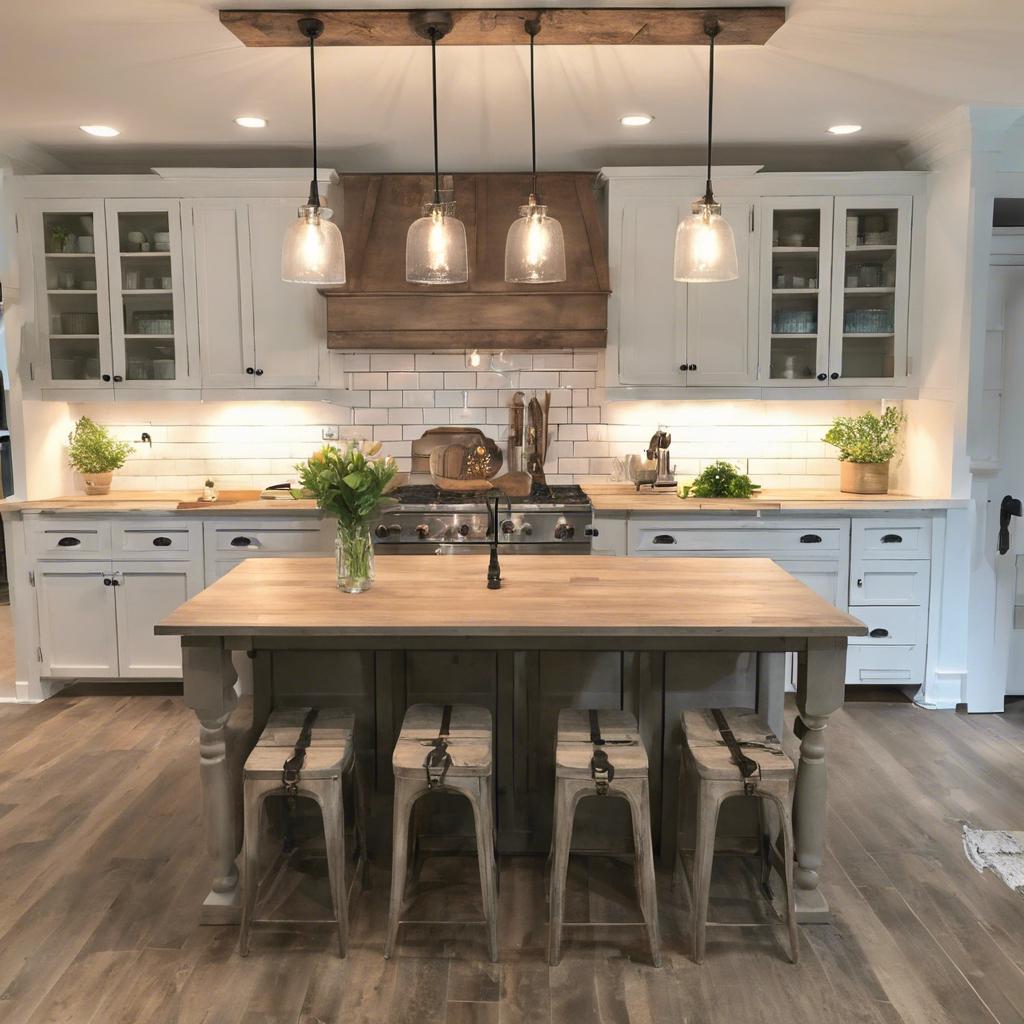
accent lighting can add a touch of personality and charm. Use dimmable wall sconces or decorative fixtures that highlight architectural features, such as open shelving or exposed beams. For additional warmth, strategically place candles or lanterns for a cozy atmosphere, especially during evening hours. To bring it all together, aim for a harmonious balance in brightness levels that reflects the farmhouse spirit — functional yet cozy, timeless yet fresh.
Tools and Gadgets Every Farmhouse Kitchen Needs
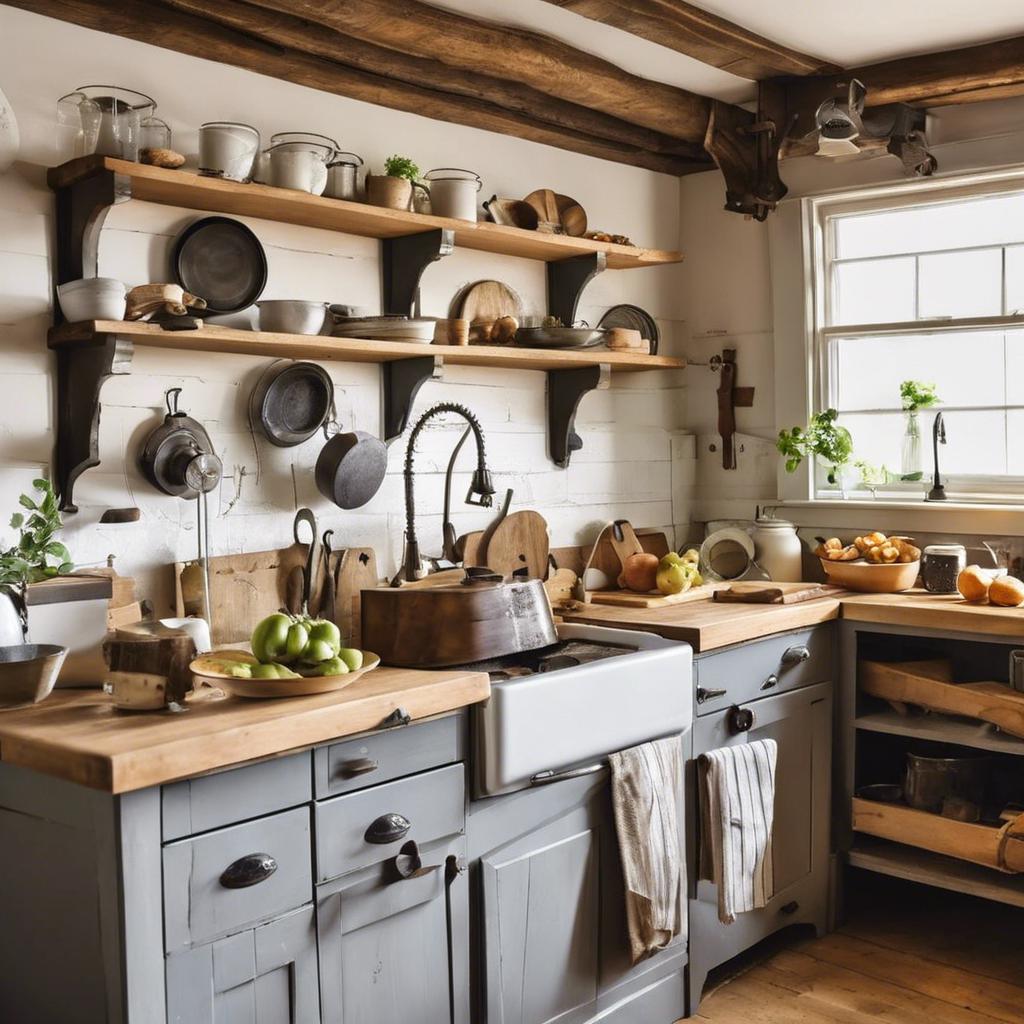
A well-equipped farmhouse kitchen marries functionality with rustic charm, enhancing the culinary experience while evoking a sense of nostalgia. Essential tools and gadgets can make all the difference, transforming everyday tasks into delightful routines. Start with a cast iron skillet—perfect for searing meats or baking cornbread, it adds rich flavor and character to every dish. A food processor becomes your best friend not only for chopping vegetables but also for creating homemade sauces and dips. Don’t overlook the charm of a hand-cranked eggbeater or a vintage canning set; these gadgets celebrate tradition while immensely aiding food preservation and preparation.
To complement these staples, consider investing in a farmhouse-style wooden cutting board, ideal for meal prep and serving charcuterie. A set of mason jars can serve multiple purposes, from ingredient storage to charming displays for dried herbs. A coffee grinder is essential for freshly ground beans, turning your morning ritual into a fragrant experience. Lastly, a multi-functional kitchen scale ensures perfect measurements, whether you’re baking from scratch or following beloved family recipes. Adding these tools will not only enhance your kitchen’s practicality but also enrich the heartwarming atmosphere that a farmhouse kitchen embodies.
Crafting a Seasonal Feel in Your Farmhouse Kitchen
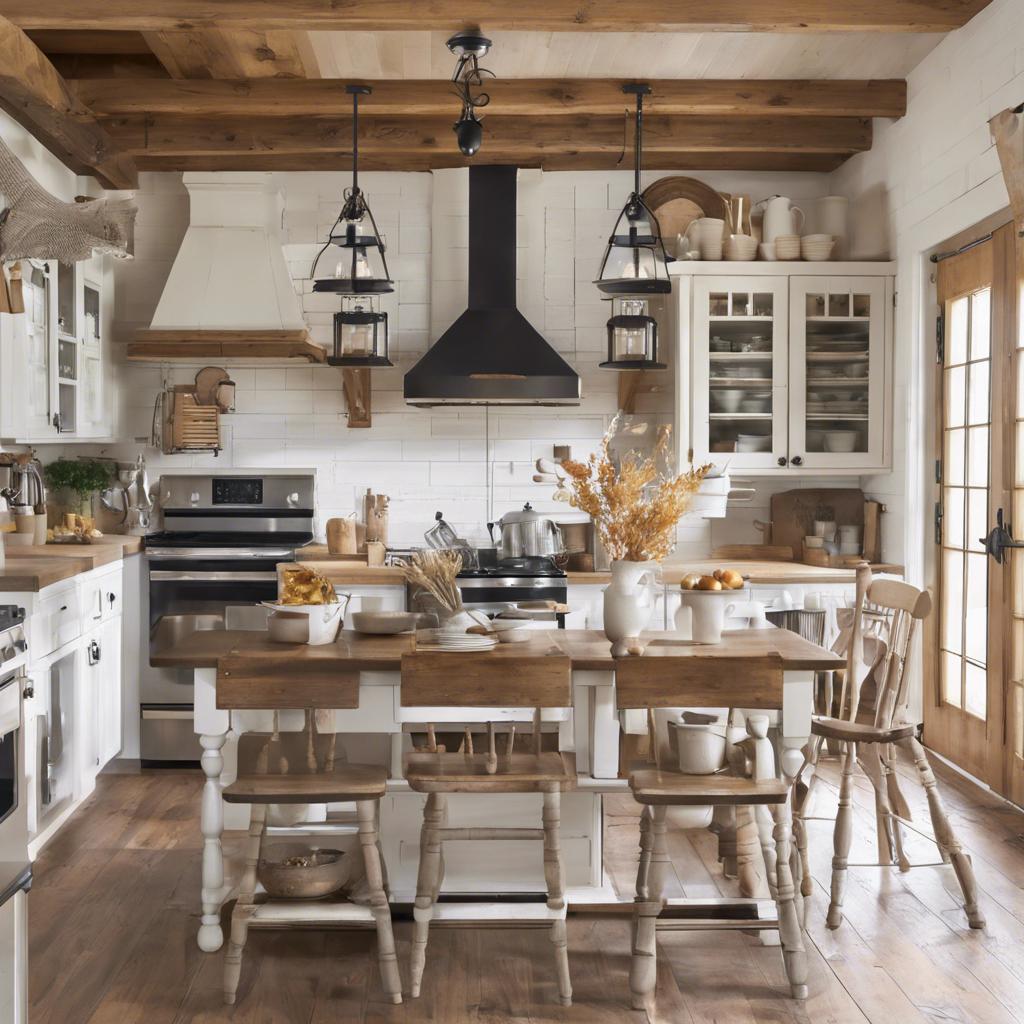
Transforming your farmhouse kitchen with a seasonal touch can be both delightful and simple. Start by introducing natural elements that resonate with the current season. For spring, consider vases filled with fresh tulips or daffodils, while autumn calls for dried leaves and rustic gourds adorning your countertops. Seasonal textiles such as tablecloths, dish towels, and curtains can enhance the atmosphere; choose fabrics that incorporate seasonal colors and patterns. Remember to rotate items like canisters and dishware to reflect your seasonal theme, creating a cohesive visual story that invites the essence of nature indoors.
Another fantastic way to embrace the charm of each season is through culinary inspiration. Curate a seasonal recipe board in your kitchen to showcase dishes made from local produce or spices that epitomize the time of year. For example, in summer, feature bright salads with tomatoes and cucumbers, while winter might spotlight hearty stews and baked goods. You can also create a small herb garden on your windowsill or countertop, providing an aromatic connection to the season’s flavors. This not only brings freshness to your meals but also intertwines a living element into your kitchen decor.
Sustainable Practices to Consider in a Farmhouse Kitchen
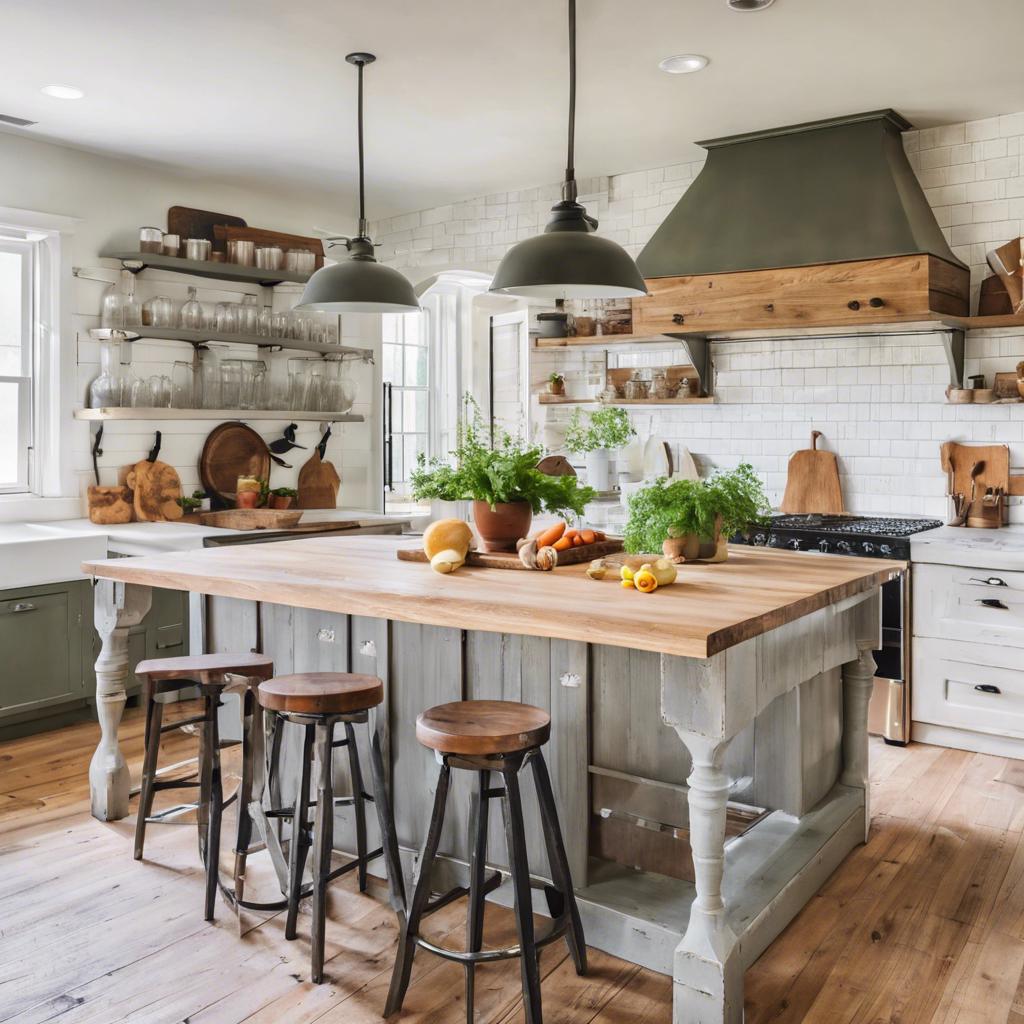
In cultivating a farmhouse kitchen that radiates both charm and sustainability, consider integrating locally-sourced ingredients into your cooking. Not only does this support local farmers and reduce the carbon footprint associated with transporting food, but it also ensures the freshest produce graces your kitchen. Additionally, invest in seasonal cooking; this approach aligns your meals with what is currently in season, promoting biodiversity and a deeper connection with the natural ebb and flow of the year. You might also explore preserving methods — canning fruits, making jams, or pickling vegetables can extend the bounty of the harvest while minimizing waste.
Moreover, the choice of materials in your kitchen is paramount in fostering sustainability. Opt for eco-friendly cookware made from materials such as cast iron, stainless steel, or bamboo. These not only offer durability but also diminish reliance on single-use plastics. Implementing a composting system encourages recycling organic waste, turning it into nutrient-rich soil for your garden, and reducing landfill impact. Remember to equip your space with energy-efficient appliances, which can significantly lower your energy consumption and utility bills. An aesthetically pleasing kitchen can be aligned with sustainable values, creating a harmonious balance between beauty and ecological responsibility.
The Joy of Cooking in a Well-Designed Farmhouse Kitchen
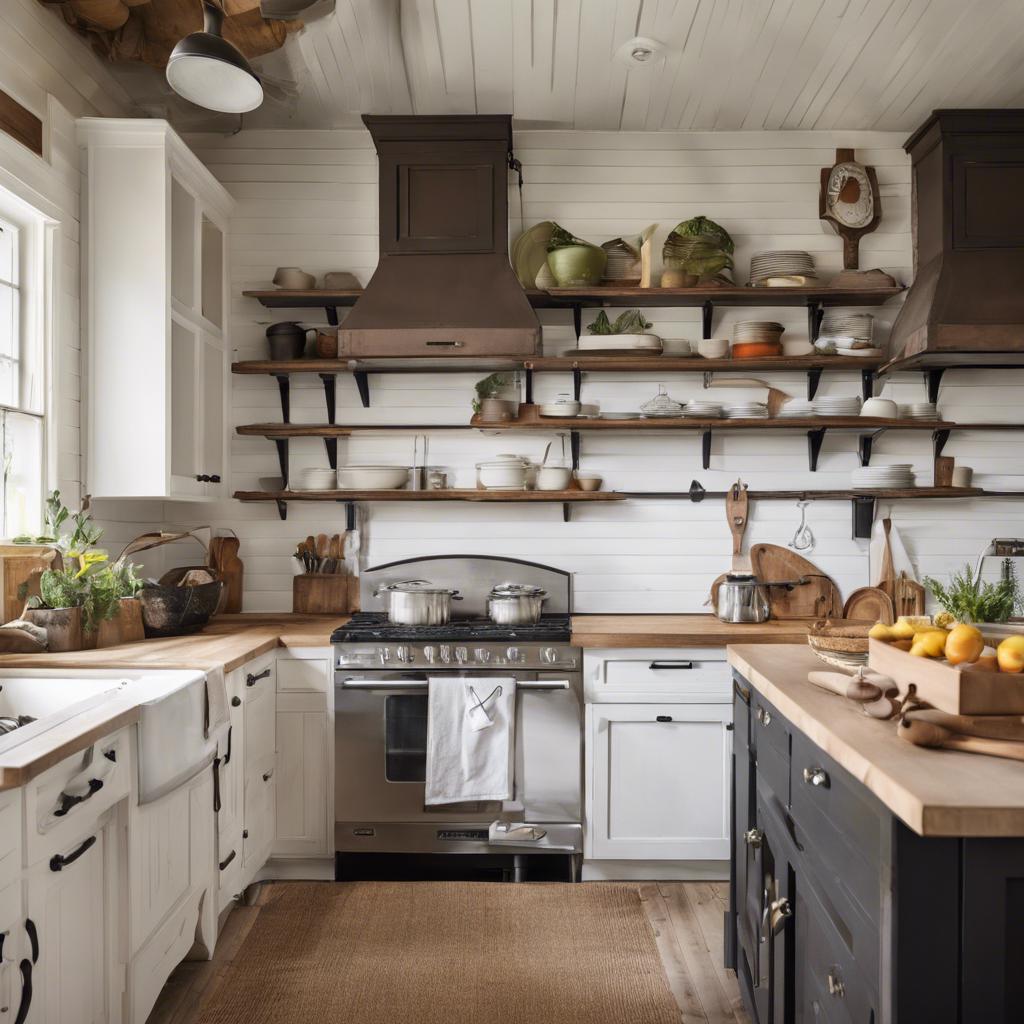
There’s something undeniably magical about preparing a meal in a farmhouse kitchen that radiates warmth and connection. The careful layout promotes a sense of flow, allowing the cook to move effortlessly between prepping, cooking, and serving. With rustic wooden counters, open shelving displaying cherished dishware, and sunlight streaming through generous windows, each moment spent here feels nurturing. A well-designed farmhouse kitchen typically features:
- Functional Workspaces: Ample counter space for chopping, kneading, and assembling dishes.
- Natural Elements: Use of wood, stone, and other organic materials that enhance the homey feel.
- Community Areas: A big table where family and friends gather, bridging the gap between cooking and sharing.
In such a setting, the act of cooking transforms into a joyful experience, merging creativity with tradition. Every family recipe shared and every new dish experimented with feels enriched by the surroundings. To enhance functionality, many farmhouse kitchens integrate smart storage solutions, ensuring that everything from the freshest herbs to the coziest bakeware is within reach. A simple table below summarizes key features:
| Feature | Description |
|---|---|
| Open Shelving | Displays favorite kitchenware and keeps essentials visible. |
| Large Kitchen Island | Serves as additional prep space and a gathering spot. |
| Farmhouse Sink | A functional and stylish centerpiece perfect for washing produce. |
Q&A
Q&A: Embracing Charm—The Heart of a Small Farmhouse Kitchen
Q1: What is the essence of a small farmhouse kitchen?
A1: The essence of a small farmhouse kitchen lies in its intimate, welcoming atmosphere. It’s a space where family and friends gather, filled with warmth and a sense of nostalgia. The charm often comes from rustic elements, personal touches, and functional design that prioritize comfort and simplicity over sleek modernity.
Q2: How can one decorate a small farmhouse kitchen while maintaining functionality?
A2: Decor can be both charming and practical! Start with a neutral color palette for a cozy backdrop, then introduce pops of color through accessories like dishware or textiles. Embrace open shelving to display beautiful dishes and jars, ensuring they’re accessible. Incorporate multi-functional furniture such as a sturdy table that doubles as workspace or dining area. don’t shy away from vintage finds—each piece adds character and storytelling to your kitchen.
Q3: What are some key design elements that define a farmhouse kitchen?
A3: Key design elements include natural materials, like wood and stone, which add warmth and texture. A farmhouse sink, often deep and practical, serves as a focal point. Wide, inviting countertops encourage culinary creativity, while elements like a central island can enhance functionality. Lighting, too, plays a crucial role; think pendant lights or rustic chandeliers that illuminate without overpowering the space.
Q4: How can someone maximize space in a small farmhouse kitchen?
A4: Maximizing space starts with smart organization. Use vertical storage solutions, such as wall-mounted racks or pegboards for pots and utensils. Opt for cabinets that reach the ceiling and consider incorporating pull-out shelves or hidden drawers to make the most of your storage potential. Additionally, keep countertops clear by utilizing tiered trays to display spices or condiments, helping you save space while maintaining accessibility.
Q5: What are some cooking and baking tips that fit well in a farmhouse kitchen?
A5: In a farmhouse kitchen, cooking is about simplicity and enjoyment. Start by embracing fresh, seasonal ingredients—signature to the farmhouse ethos. Batch cooking or meal prepping can help you make the most of your time while minimizing waste. When baking, experiment with traditional recipes that reflect the heart of homestyle comfort, using equipment that feels familiar. Lastly, don’t forget to involve family in the process; sharing recipes becomes a meaningful tradition.
Q6: How does one incorporate personal touches into their farmhouse kitchen?
A6: Personal touches transform a kitchen into a beloved heart of the home. Display family heirlooms, like a vintage breadbox or an old cookbook, to spark conversations. Hang up artwork or photographs that resonate with your memories, whether they’re family portraits or botanical prints. You might also designate a corner for growing herbs or displaying potted plants, adding life and fragrance to the space while keeping the focus on nature.
Q7: What are some common pitfalls to avoid when designing a small farmhouse kitchen?
A7: One common pitfall is overcrowding the space with too many decorative elements, which can overwhelm rather than enhance. Aim for a balance between decoration and function—choose a few statement pieces instead of cluttering surfaces. Avoid dark color palettes that can make the space feel smaller; instead, opt for lighter shades that reflect light. don’t overlook practicality; ensure that your kitchen layout promotes a smooth workflow, keeping essentials within arm’s reach.
Q8: Why is the kitchen considered the heart of the home, especially in a farmhouse setting?
A8: The kitchen is often seen as the heart of the home because it’s where daily life unfolds—meals are prepared, stories are shared, and traditions are celebrated. In a farmhouse setting, this sentiment is amplified by the communal nature of cooking and dining, fostering connection and togetherness. It’s a space that embodies warmth and belonging, inviting everyone in for laughter, nourishment, and hospitality.
Key Takeaways
As we close the chapter on the enchanting world of small farmhouse kitchens, it’s clear that these spaces are more than just a backdrop for culinary creations; they are where heart and home entwine. Embracing charm in every corner—from the well-loved wooden surfaces to the delicate lace curtains—these kitchens remind us of the simple joys in life. They invite connections, whether it’s over a shared recipe or a cup of coffee with a cherished friend. As we navigate our own kitchen journeys, may we always find ways to infuse warmth and personality into our spaces, celebrating the beauty of simplicity and the memories crafted within. So, whether you’re whipping up a family favorite or savoring quiet moments alone, remember that the charm of a small farmhouse kitchen lies not just in its aesthetics, but in the love and laughter that fill its walls. Here’s to creating your own version of that inviting heart, where every meal tells a story and every gathering is a cherished memory.
